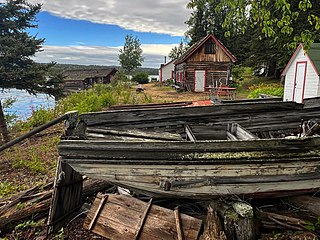
Isle Royale National Park is an American national park consisting of Isle Royale, along with more than 400 small adjacent islands and the surrounding waters of Lake Superior, in the state of Michigan.
A land ethic is a philosophy or theoretical framework about how, ethically, humans should regard the land. The term was coined by Aldo Leopold (1887–1948) in his A Sand County Almanac (1949), a classic text of the environmental movement. There he argues that there is a critical need for a "new ethic", an "ethic dealing with human's relation to land and to the animals and plants which grow upon it".

Aldo Leopold was an American writer, philosopher, naturalist, scientist, ecologist, forester, conservationist, and environmentalist. He was a professor at the University of Wisconsin and is best known for his book A Sand County Almanac (1949), which has been translated into fourteen languages and has sold more than two million copies.

The Adirondack Park is a park in northeastern New York protecting the Adirondack Mountains. The park was established in 1892 for "the free use of all the people for their health and pleasure", and for watershed protection. At 6.1 million acres, it is the largest park in the contiguous United States.
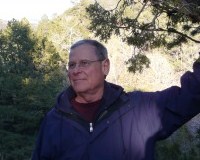
J. Baird Callicott is an American philosopher whose work has been at the forefront of the new field of environmental philosophy and ethics. He is a University Distinguished Research Professor and a member of the Department of Philosophy and Religion Studies and the Institute of Applied Sciences at the University of North Texas. Callicott held the position of Professor of Philosophy and Natural Resources at the University of Wisconsin–Stevens Point from 1969 to 1995, where he taught the world's first course in environmental ethics in 1971. From 1994 to 2000, he served as vice president then president of the International Society for Environmental Ethics. Other distinguished positions include visiting professor of philosophy at Yale University; the University of California, Santa Barbara; the University of Hawaiʻi; and the University of Florida.

The University of Wisconsin–Stevens Point is a public university in Stevens Point, Wisconsin. Established in 1894, it is part of the University of Wisconsin System. UW-Stevens Point grants associate, baccalaureate, and master's degrees, as well as doctoral degrees in audiology, educational sustainability, and physical therapy. In 2018, UW-Stevens Point merged with UW-Stevens Point at Wausau and UW-Stevens Point at Marshfield. The 406-acre (164 ha) main campus includes the 280-acre (113 ha) Schmeeckle Reserve on the north side of the Campus. There are 15 academic buildings, and 13 Residence Halls.

Environmental philosophy is the branch of philosophy that is concerned with the natural environment and humans' place within it. It asks crucial questions about human environmental relations such as "What do we mean when we talk about nature?" "What is the value of the natural, that is non-human environment to us, or in itself?" "How should we respond to environmental challenges such as environmental degradation, pollution and climate change?" "How can we best understand the relationship between the natural world and human technology and development?" and "What is our place in the natural world?" Environmental philosophy includes environmental ethics, environmental aesthetics, ecofeminism, environmental hermeneutics, and environmental theology. Some of the main areas of interest for environmental philosophers are:
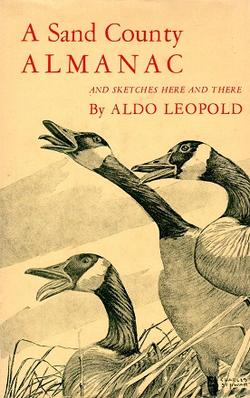
A Sand County Almanac: And Sketches Here and There is a 1949 non-fiction book by American ecologist, forester, and environmentalist Aldo Leopold. Describing the land around the author's home in Sauk County, Wisconsin, the collection of essays advocate Leopold's idea of a "land ethic", or a responsible relationship existing between people and the land they inhabit. Edited and published by his son, Luna, a year after Leopold's death, the book is considered a landmark in the American conservation movement.
Richard K. Nelson, also known as "Nels", was an American cultural anthropologist and writer. He grew up living in Wisconsin, receiving his education from the University of Wisconsin–Madison before earning his Ph.D. degree from the University of California. Nelson spent many years living in Interior Alaska with indigenous people, reflected through his work. His work has focused primarily on the indigenous cultures of Alaska and, more generally, the relationships between people and nature. He was the host to a public radio series called Encounters aired nationally. He has been awarded a variety of awards for his commitment to the community as an activist, serving on the Sitka Conservation Society, and for his creativity as both an author and artist. Nelson died in a San Francisco Hospital at the age of 77 from a long-term battle with cancer.

A conservation officer is a law enforcement officer who protects wildlife and the environment. A conservation officer may also be referred to as an environmental technician/technologist, game warden, park ranger, forest watcher, forest guard, forester, gamekeeper, investigator, wildernessofficer, wildlifeofficer, or wildlife trooper.

Ricardo Rozzi is a Chilean ecologist and philosopher who is professor at the University of North Texas and the Universidad de Magallanes (UMAG). His research combines the two disciplines through the study of the interrelations between the ways of knowing and inhabiting the natural world, proposing a dynamic continuous reciprocal feedback between both domains.
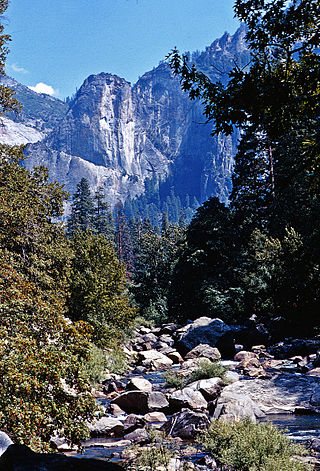
Conservation in the United States can be traced back to the 19th century with the formation of the first National Park. Conservation generally refers to the act of consciously and efficiently using land and/or its natural resources. This can be in the form of setting aside tracts of land for protection from hunting or urban development, or it can take the form of using less resources such as metal, water, or coal. Usually, this process of conservation occurs through or after legislation on local or national levels is passed.
Judith Andre is a philosophy professor (retired) and virtue theorist. She earned her Ph.D. at Michigan State University in 1979 and has taught courses on ethical issues in global public health, ethics and development, animal welfare, and virtue theory at Old Dominion University and Michigan State University before retiring.
Robert T. Lackey is a Canadian born fisheries scientist and political scientist living in the United States. He is best known for his work involving the interplay between science and policy, natural resource management, and assessments of the future of salmon runs. Lackey is a professor of fisheries and wildlife and adjunct professor of political science at Oregon State University. From 1981-2008, he held senior leadership posts at the United States Environmental Protection Agency research laboratory in Corvallis, Oregon.

William J. Ripple is a professor of ecology at Oregon State University in the Department of Forest Ecosystems and Society. He is best known for his research on terrestrial trophic cascades, particularly the role of the gray wolf in North America as an apex predator and a keystone species that shapes food webs and landscape structures via “top-down” pressures.

The H.J. Andrews Experimental Forest, commonly referred to as Andrews Forest, is located near Blue River, Oregon, United States, and is managed cooperatively by the United States Forest Service's Pacific Northwest Research Station, Oregon State University, and the Willamette National Forest. It was one of only 610 UNESCO International Biosphere Reserves, until being withdrawn from the program as of June 14, 2017, and a Long Term Ecological Research site. It is situated in the middle of the Western Cascades.
Kathleen Dean Moore is a philosopher, writer, and environmental activist from Oregon State University. Her early creative nonfiction writing focused on the cultural and spiritual values of the natural world, especially shorelines and islands. Her more recent work is about the moral issues of climate change.
Clare Palmer is a British philosopher, theologian and scholar of environmental and religious studies. She is known for her work on environmental and animal ethics. She was appointed as a professor in the Department of Philosophy at Texas A&M University in 2010. She had previously held academic appointments at the Universities of Greenwich, Stirling, and Lancaster in the United Kingdom, and Washington University in St. Louis in the United States, among others.
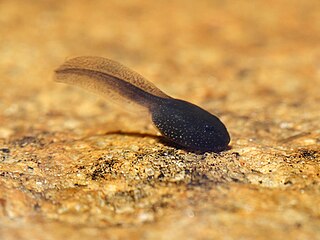
The relationship between animal ethics and environmental ethics concerns the differing ethical consideration of individual nonhuman animals—particularly those living in spaces outside of direct human control—and conceptual entities such as species, populations and ecosystems. The intersection of these two fields is a prominent component of vegan discourse.













